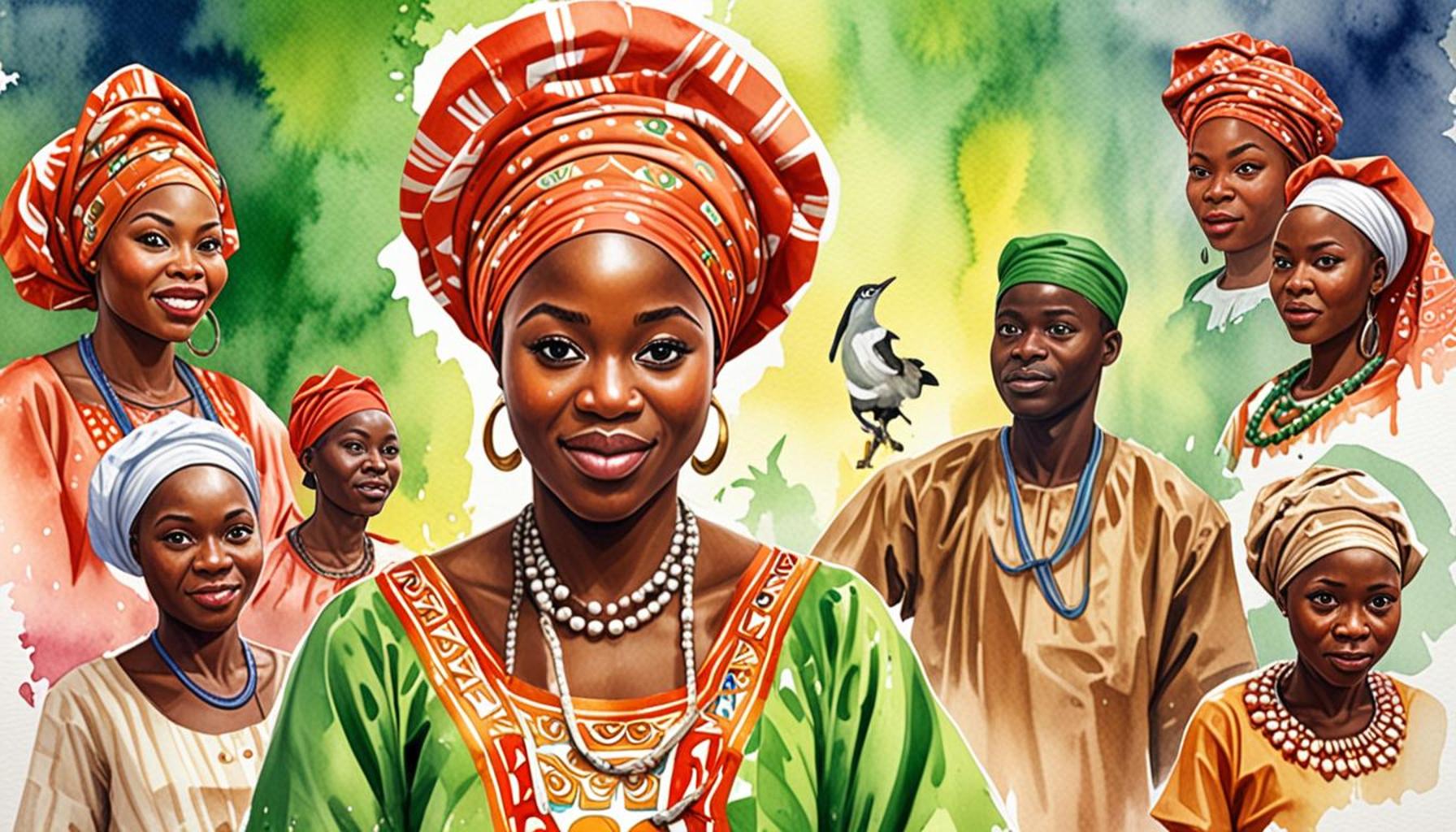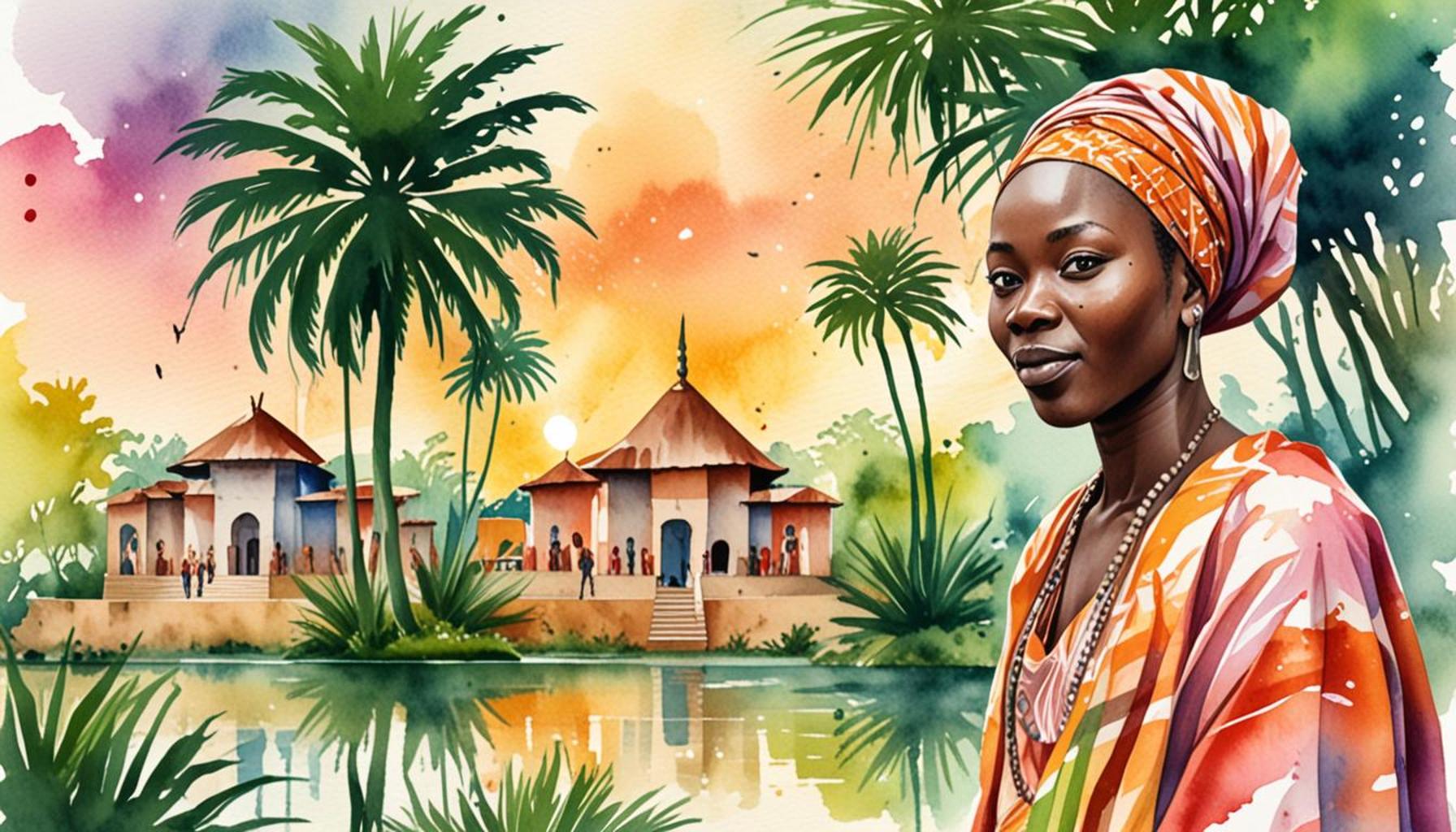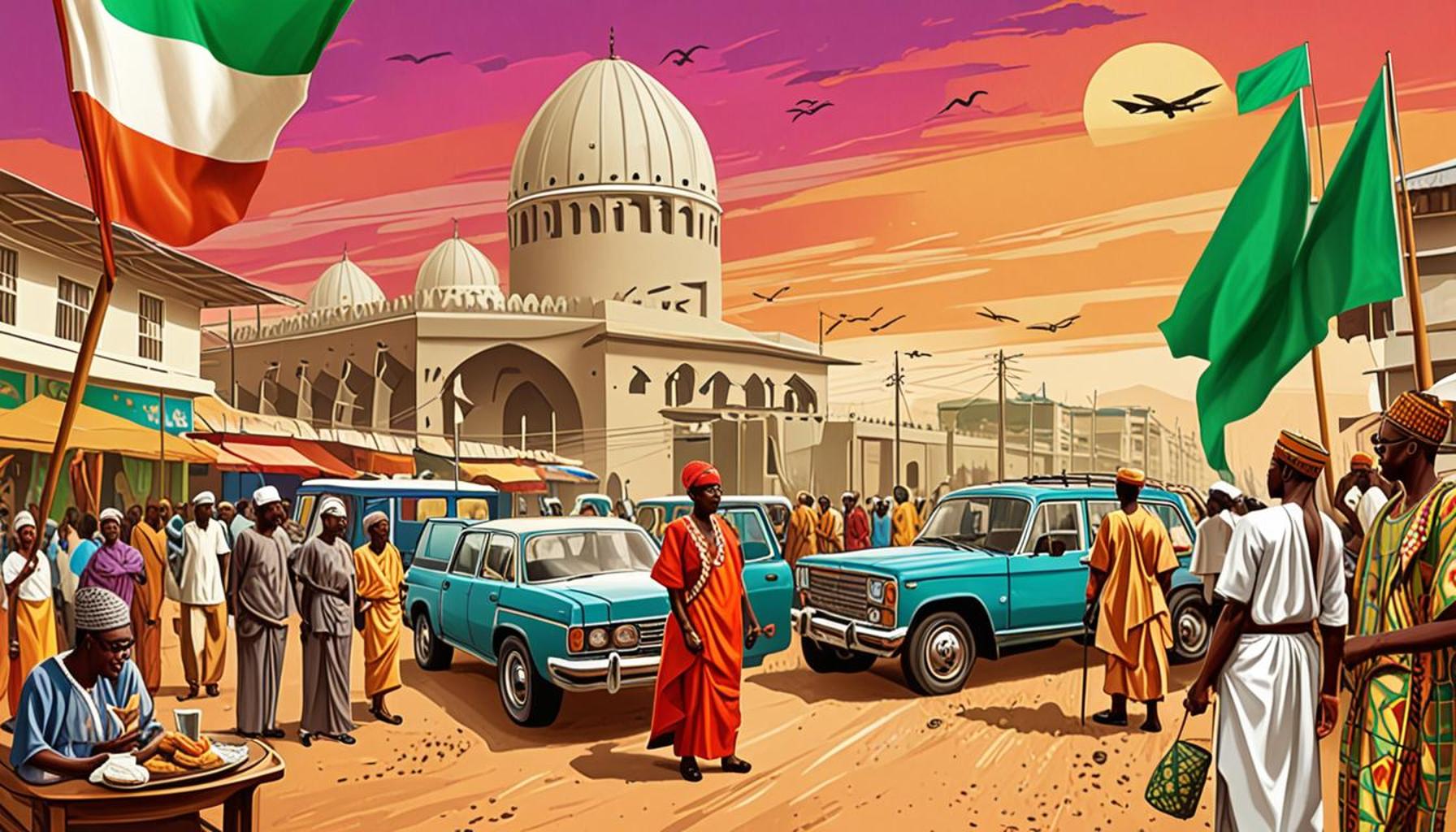Traditions and Festivals: Itineraries to Experience the Cultural Celebrations of Nigeria

The Rich Tapestry of Nigerian Festivals
Nigeria is a land steeped in tradition, where vibrant cultures and rich histories come alive through its numerous festivals. Each event is a unique expression of the nation’s diverse ethnic groups, showcasing an incredible range of customs, beliefs, and artistic expressions. Festivals such as the Durbar Festival in the north and the sacred Osun-Osogbo Festival in the southwest invite both locals and tourists to witness the enchanting sights and sounds that define the Nigerian spirit.
Annual Festivals: A Showcase of Culture
- Eyo Festival: Celebrated in Lagos, the Eyo Festival is a significant cultural event that honors the legacy of the late Oba of Lagos. Participants dress in white robes and colorful masquerades, parading through the streets of the city, accompanied by the rhythmic beats of traditional drums. This festival not only captivates with its visual splendor but also reinforces community bonds as people gather to commemorate their heritage.
- New Yam Festival: This festival, predominantly celebrated by the Igbo people, marks the beginning of the harvest season. It involves the offering of yams to the gods to ensure a bountiful harvest, followed by joyous feasting and dancing. Local dishes such as jollof rice and pepper soup often take center stage, showcasing Nigeria’s rich culinary diversity.
Cultural Significance and Community Connection
Nigerian festivals are more than mere celebrations; they often encapsulate profound historical narratives and spiritual beliefs. For instance, the Osun-Osogbo Festival honors the river goddess Osun and emphasizes the importance of the river to the local community’s livelihood and culture. Such events are powerful reminders of the interconnectedness of religion, tradition, and nature in the lives of the people.
Unique Itineraries: Engaging with Local Communities
Exploring Nigeria’s festivals can be an enriching experience that goes beyond the surface. Travelers are encouraged to discover tailored itineraries that lead to the heart of these celebrations, providing opportunities to engage authentically with local communities. This immersion allows visitors not only to observe but also to participate in the festivities, deepening their appreciation for the country’s cultural heritage.
Whether you wish to dance to the vibrant sounds of traditional music, marvel at stunning costumes, or savor popular local delicacies, Nigeria’s festivals promise unique and unforgettable encounters. As you journey through these cultural celebrations, you will be captivated by the enthusiasm of locals and the intricate arts that reflect the very essence of Nigeria.
Prepare to embark on a fascinating adventure through Nigeria’s rich heritage, where each festival illuminates the dynamic and diverse traditions that make this country truly remarkable.

ADDITIONAL INSIGHTS: Expand your understanding here
The Vibrancy of Nigerian Festivals
Nigeria’s festivals are a crescendo of colors, sounds, and cultural narratives that reflect the heart of the nation. Each celebration is an opportunity to understand the deep-rooted traditions and shared histories among more than 250 ethnic groups. From the bustling streets of urban centers to the serene landscapes of rural communities, the atmosphere during these times is electrifying, inviting participation from both locals and visitors alike.
Season of Celebrations: Key Festivals to Experience
- Durbar Festival: This spectacular event primarily occurs during the Eid al-Fitr celebrations in northern Nigeria, showcasing the rich equestrian traditions of the Hausa-Fulani culture. Festooned horses and their riders clad in resplendent attire parade through the streets, narrating tales of bravery and valor. Each rider participates with pride, displaying their horsemanship skills, while local drummers provide a pulsating rhythm that resonates throughout the city.
- Ouidah Festival: Celebrated in the coastal town of Ouidah, this festival is an homage to the Yoruba heritage of the area and highlights the historical significance of the transatlantic slave trade. Participants engage in a reconciliation procession, complete with traditional music, dances, and rituals that pay tribute to the ancestors. This festival not only serves to remember but also reinforces a sense of belonging and community among attendees.
- Calabar Carnival: Dubbed as “Africa’s Biggest Street Party,” the Calabar Carnival occurs every December and draws thousands to the city of Calabar. This grand festival features colorful parades, cultural displays, music, and dance, attracting both national and international tourists. Local groups compete in showcasing their cultural heritage, and the event culminates in an electric atmosphere of celebration and unity.
Rooted in History: Significance of Festivals
Nigerian festivals serve as crucial points for preserving history, culture, and social values. Each festivity tells stories of ancestors, ancestral lands, and the evolution of communities through oral traditions. For instance, the Igbo New Yam Festival not only marks the harvesting of yams but also symbolizes gratitude to the earth and the shared values of communal living. Festivals like these act as a semblance of continuity—fostering stronger ties among generations while celebrating cultural identity.
Crafting Your Cultural Journey
To experience Nigeria’s festivals authentically, tailored itineraries can lead to a voyage into the heart of its cultural celebrations. Travelers are encouraged to participate actively in the preparations, attend workshops, and engage with local artisans. Such experiences can include learning traditional dance steps, crafting indigenous textiles, or savoring the flavors of regional dishes. This close engagement offers a richer understanding of Nigerian culture, allowing visitors to not only be observers but integral parts of the celebration.
As you embark on this journey, you will discover that Nigeria’s festivals are not just events on a calendar; they are a living remembrance of a diverse heritage that welcomes all to join in the revelry, beauty, and unity that these cultural icons foster.
| Category | Benefits |
|---|---|
| Cultural Exposure | Engaging with Nigeria’s diverse traditions enriches your understanding of global cultures. |
| Community Connection | Participating in local festivals fosters a sense of belonging and unity with Nigerian communities. |
Exploring the vibrant celebrations in Nigeria provides an unparalleled opportunity for cultural immersion. From the colorful attire of the Osun-Osogbo Festival to the rhythmic beats of the Calabar Carnival, traveling through these festivities reveals stories, histories, and traditions that define the Nigerian spirit. Each festival has unique rituals and traditions, such as the intricate masquerade performances during the Eyo Festival in Lagos, bringing to life the essence of Nigerian heritage.Moreover, discovering these festivals allows travelers to forge meaningful connections with local communities. Engaging with Nigerian residents during these celebrations fosters not only cultural exchange but also acts as a bridge that connects different backgrounds. Witnessing firsthand the joy shared in these events promotes better understanding and appreciation of Nigeria’s rich tapestry of cultures. With itineraries specifically tailored to encompass these experiences, visitors are offered a chance to explore the country’s heart, uncover its vibrant heritage, and create lifelong memories. The allure of Nigeria’s traditions and festivals is not just in their visual splendor but also in the stories and friendships that blossom amidst the celebrations, awaiting those adventurous enough to join.
LEARN MORE: This related article may interest you
Experiencing Festivals: Local Delights and Activities
For travelers seeking to dive deeper into Nigeria’s rich tapestry of traditions, each festival offers a distinct blend of local delights and engaging activities that enhance the overall experience. Participants can taste the culinary creations traditional to each festivities or engage in hands-on activities that connect them with the community’s storied past.
- Food Festivals: Seasonal gatherings in regions like the North Central and South East showcase local delicacies, from jollof rice to the iconic yam porridge. Markets buzz with bartering and socializing, as participants savor dishes prepared with unique regional spices and flavors. The Ofada Rice Festival, for instance, not only celebrates the unique local rice variety but also highlights the culinary skills of the women who prepare it.
- Workshops and Skill Sharing: Many festivals incorporate workshops where attendees can learn traditional crafts such as bead-making, weaving, and pottery. For example, during the Cultural Festival in Benin City, participants can immerse themselves in the art of bronze casting, a skill deeply entrenched in the rich cultural history of the Edo people.
- Traditional Sports: Festivals often highlight local sporting events that reflect the community’s heritage. Activities such as Masquerade Dance and the thrilling Okada Racing involve spectacular displays of agility and skill. Participating as a spectator or even taking part fosters community spirit while providing a front-row seat to these exhilarating traditions.
Music, Dance, and Performative Arts
No festival in Nigeria is complete without an explosion of music and dance that reverberates through the venues. Each ethnic group brings its own traditional music styles, which act as storytelling devices to convey historical events or moral lessons through rhythm and melody.
The Sango Festival, devoted to the Yoruba god of thunder, features live drumming sessions, energetic dance performances, and theatrical reenactments that attract many participants eager to engage with these captivating forms of artistic expression. Visitors can also take part in community dance circles, learning traditional steps from skilled dancers and becoming enveloped in the festive mood.
Nurturing Cultural Exchange
Moreover, festivals serve as vibrant platforms for cultural exchange, drawing in people from diverse backgrounds. As travelers mix with locals, they create lasting bonds while exchanging stories, traditions, and worldviews. The Lagos Carnival, for instance, has become a melting pot of cultures, where both Nigerians and expatriates showcase their heritage, contributing to a collective celebration of diversity.
By engaging in conversations, participating in local customs, or simply indulging in the joyous atmosphere, visitors can forge connections that transcend borders. These interactions foster an appreciation for Nigeria’s multifaceted identity while promoting mutual respect and understanding among all cultures present during these festivals.
Travelers planning to experience Nigeria’s festivals are encouraged to explore various regions and schedules, ensuring that they engage with the local communities meaningfully. Important resources, such as local tourism boards and festival websites, provide updates and guidance for participants eager to immerse themselves in the dynamic cultural landscape of Nigeria.
YOU MAY ALSO LIKE: Read read another article
Conclusion
As we conclude our exploration of Nigeria’s vibrant traditions and festivals, it becomes evident that these celebrations transcend mere observance; they are communal experiences that encapsulate the rich diversity and history of the nation. From the delectable offerings at food festivals to the energetic displays of music and dance, every event provides a unique lens through which visitors can understand and appreciate Nigeria’s intricate cultural fabric.
Participating in these festivals, whether it’s the colorful Lagos Carnival or the ancestral rites at the Sango Festival, presents travelers with unforgettable opportunities to forge connections and immerse themselves in the local way of life. These gatherings foster cultural exchange, allowing intermingling between locals and visitors, creating a melting pot of experiences that enrich the spirit and broaden perspectives.
For those eager to discover Nigeria’s cultural gems, proper planning is key. Engaging with reliable resources, such as local tourism boards and festival websites, will ensure that travelers navigate the festivities with insight and enthusiasm. As you embark on your journey through Nigeria’s captivating celebrations, remember that each festival is not just a spectacle but a living testament to the unity and resilience of its people.
Ultimately, Nigeria’s traditions and festivals are invitations to partake in a shared heritage, offering an exhilarating blend of art, spirit, and communal joy that is truly unparalleled. Embrace the journey and allow the rhythms of Nigeria to weave unforgettable memories into your travels.


